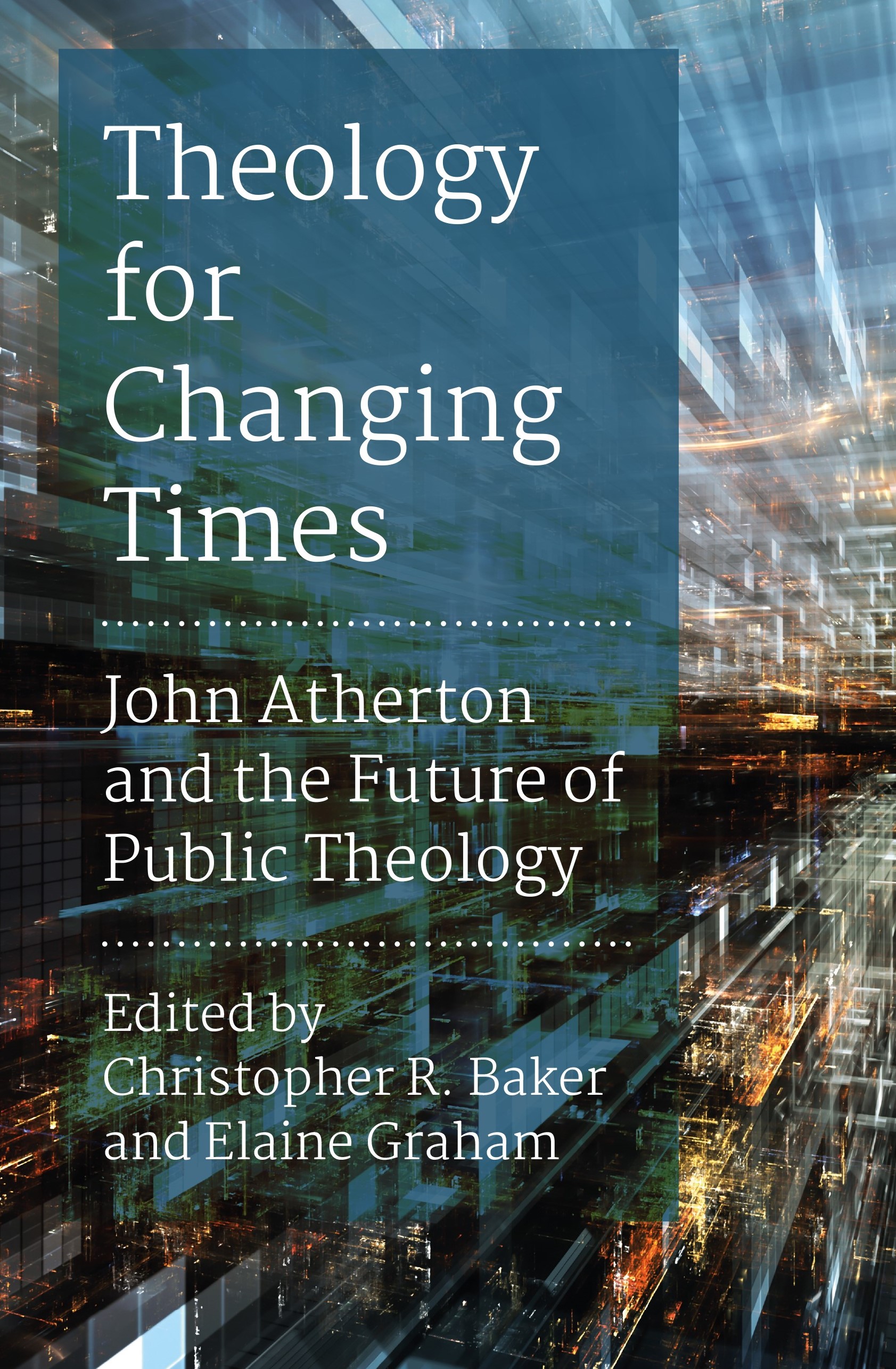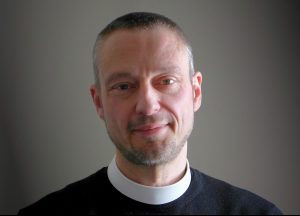Edward Carter: “Theology for Changing Times”, edited by Chris Baker & Elaine Graham

Theology for Changing Times is a diverse collection of essays by different authors, all responding to a greater or lesser extent to the work of John Atherton, who died in 2016. Atherton was one of the leading practitioners of his generation when it came to Anglican ‘public theology’, part of a tradition that included William Temple and Ronald Preston, and is now represented by Malcolm Brown and others.
It is rather a piece-meal book and, for me, it did not really in the end describe a coherent or systematic Anglican method for doing public theology, or for engaging theologically with themes such as the economy and enterprise – perhaps this is impossible or even undesirable. However, it conveys in a hopeful and optimistic way the challenge of the task, and illustrates convincingly the kinds of ways in which the Church (perhaps especially the Church of England) might continue to engage in this ministry. Taken as a whole, it captures well the importance of the Anglican “public theology” tradition, as well as the sense that the Church of England increasingly has other preoccupations, perhaps more focused on the perceived need to attend to internal, rather than ‘public square’, matters. It also contains a good number of valuable nuggets.
There are twelve chapters, the first and last being provided by the editors, Christopher Baker and Elaine Graham, in traditional festschrift style. These set out a clear description of Atherton’s programme, using summary statements such as this 1992 description of Christian social thought: ‘A dynamic interaction between the understanding of God’s purposes mediated through Christian tradition, but equally through the secular realities of life’ (page 7). Such an approach allows for collaboration with people of all faiths and none, and sketches out a ‘big picture’ way of doing public theology which takes seriously inter-disciplinary studies. Atherton was deeply familiar with the study of economics, history and politics, as well as theology.
For those interested in the work of the Centre for Enterprise, Markets and Ethics, the section in Chapter One on the Morality of the Market (pages 10-14) will be of particular interest. This covers themes such as human flourishing, the problem of scarcity, the role for the market, questions of interconnection and integration, as well as Atherton’s attempt to use the language of transfiguration when it comes to describing Christianity’s potential effect on the market. Although Atherton strained some of his personal friendships with his increasingly broadly sympathetic stance towards the market economy, I found myself wondering at one or two points whether he was really willing to work with the raw competitive power within it. In more general terms, the well-made point in the Chapter Twelve ‘Afterword’, that the Holy Spirit is bigger than the Church, even while the Church is a necessary part of the picture, serves as a kind of framework or backdrop for the entire Athertonian approach.
Chapter Two is a revised version of an Atherton article published in Sweden in 2017, being one of the last things he wrote. It contains some fascinating economic history, and espouses a desire to develop a theological methodology that can be fit for purpose in the face of ever-increasing economic change. I was struck by how ‘secular’ this chapter was; the themes of change and progress were presented through the lens of economic history, which raised questions for me about other ways of describing growth and ‘pilgrim’s progress’, which seemed to be missing.
Chapter Three, by Hilary Russell, offers a warm appreciation of Atherton’s method and how it evolved over time. Complementing this is Peter Sedgwick’s piece (Chapter Four) on the ‘Manchester School’ of public theology, which involves the University, the Cathedral, and the William Temple Foundation. John Atherton embodied all of these aspects, and without him this ‘School’, or ‘story and a place’ (page 57) as Sedgwick prefers, might not have gained such prominence. Of interest here are the attacks on the ‘Manchester School’ approach by theologians such as the late John Hughes, springing out of the Hauerwas tradition which places more emphasis on ecclesial ethics.
Chapter Five, by Carl-Henric Grenholm (Atherton had strong links to academia in Sweden), addresses the question of globalization. It was pleasing to find Brian Griffiths, the Chairman of the CEME, mentioned as part of the discussion. Then Chapter Six, by Malcolm Brown, turns to the subject of Industrial Mission. Brown always writes clearly and engagingly, and his survey of the history of Industrial Mission in England is informative and set well within the bigger context of theological shifts.
Chapter Seven, from Ian Steedman, comes from a rather different perspective. Steedman is an economist, and as such is happy to argue for a place for efficiency – and to suggest that Atherton could accept this. However, the heart of Steedman’s discussion focuses on the role of advertising, and the way in which ‘wants’ are generated in the economy. I feel sure Steedman’s themes could be productively engaged with in a more theological way, exploring the place for persuasion and education within human interactions and the forming of societal norms.
In Chapter Eight, John Reader makes an attempt at wrestling with the consequences of the digital revolution, which he describes as ‘blurring the boundaries between the physical, digital and biological spheres.’ (page 110) I was pleased to find a section of this kind in the book, as otherwise it might have felt slightly behind the curve in terms of the impact of social media and other recent developments. Reader’s best elucidated comments connect to the significance of speed in economic life, and the loss of space for critical reflection and even silence.
William Storrar, in Chapter Nine, addresses the current ‘angry’ nature of public discourse. I learnt a great deal about Kant and his theories of ‘publicity’ and ‘transition’, by which a steady but slow formation of opinion and of the public view can come about. The need for a richer and more nuanced political discourse is argued for eloquently by Storrar, and his connection to the Manchester School’s ‘middle axioms’ is intriguing.
Chapter Ten, by Anna Ruddick, is focused on urban mission, and she draws approvingly on the Sam Wells ‘being with’ theme. Her definition of human flourishing stood out for me: ‘…a stronger love of self, a more positive approach to life choices, an increased ability to act, increasing awareness of a good God, and mutuality.’ (page143) Finally, Chapter Eleven, by Maria Power, concerns the need for a Roman Catholic public theology for Northern Ireland, and looks to resources within Atherton’s incarnational and practical methodologies.
My sense is that the ever-increasing pace of change within the economy and within politics will be a challenge for the kind of Public Theology done by the William Temple Foundation. The recent emergence of the HeartEdge network, led by St Martin-in-the-Fields, and which my own church is a member of, perhaps points to another model which is both theologically rich but also potentially more nimble and responsive. It would have been fascinating to ask John Atherton for his view on this initiative, which has only emerged since his death.
“Theology for Changing Times – John Atherton and the Future of Public Theology”, edited by Christopher R Baker & Elaine Graham was published in 2018 by SCM Press (ISBN-13: 978-0334056959). 192 pp.
 Edward Carter is Vicar of St Peter Mancroft Church in Norwich, having previously been the Canon Theologian at Chelmsford Cathedral, a parish priest in Oxfordshire, a Minor Canon at St George’s Windsor and a curate in Norwich. Prior to ordination he worked for small companies and ran his own business.
Edward Carter is Vicar of St Peter Mancroft Church in Norwich, having previously been the Canon Theologian at Chelmsford Cathedral, a parish priest in Oxfordshire, a Minor Canon at St George’s Windsor and a curate in Norwich. Prior to ordination he worked for small companies and ran his own business.
He chairs the Church Investors Group, an ecumenical body that represents over £10bn of church money, and which engages with a wide range of publicly listed companies on ethical issues. His research interests include the theology of enterprise and of competition, and his hobbies include board-games, volleyball and film-making. He is married to Sarah and they have two adult sons.
